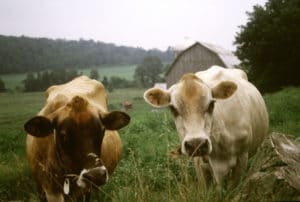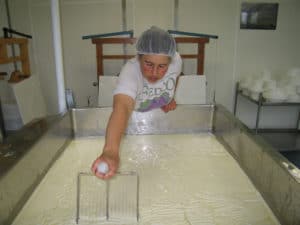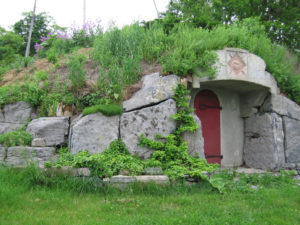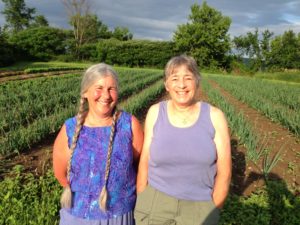Orb Weaver Farm
Marjorie Susman and Marian Pollack pioneered the artisanal cheese making movement.
The cyclical rhythm of nature is the foundation that supports Marjorie Susman and Marian Pollack of Orb Weaver Farm. Like the cyclical pattern of a spider’s web, Orb Weaver farm engages the seasonal activities on the farm. In the words of Marjorie “sowing, harvesting and enriching the soil to grow new pastures and gardens, season after season.”
Starting over 30 years ago in the Town of Monkton, VT, Marjorie and Marian began farming and soon purchased a herd of Jersey cattle to set out to make cheese. When they began producing cheese they were working out of the mainstream because at that time there were only a handful of people making artisan cheese on the farm. For Marjorie and Marian it seemed to be just the right enterprise. They began learning about cheese making by participating in a workshop given by Ricki Carroll of New England Cheese Making, and began preparing cheese in their kitchen.
Marian and Marjorie were never concerned about the type of cheese they were making; rather, they created their own recipe for cheese that, as Marjorie put it, is “good tasting, kid friendly, something just right for making macaroni and cheese.”
To be more specific, their cheese is something in between Havarti and Colby. Their aged cheese she likened to a Gruyere.
They have 7 cows that are milked twice each day from November through May. These seven cows provide about 50 pounds of milk per cow, per day. From the milk the two cheese makers craft 7,000 pounds of artisan cheese each season. Their cheese is truly outstanding, as evidenced by their receiving numerous national and international awards. In 1989, Orb Weaver farm was presented the Innovative Farmer of the Year Award by “Country Folks.”
The cows are honored for their work and are given names based on family themes and nicknames. As the organic vegetable enterprise gears up each season, the cows are set out to pasture. When the animals reach the end of their productive lives they aren’t sent to the auction barn. “We wouldn’t want to put them through that humiliation,” Marjorie said. Orb Weaver cows are sent to a local butcher house, and their meat is donated to H.O.P.E. food shelf in Middlebury.
The vegetable portion of the farm consists of a wide variety of crops including just about everything from lettuce and shallots, to root crops and artichokes. Marian related, “Tomatoes are probably our favorite crop. First of all, a tomato grown out of doors tastes like a tomato should. Bright and juicy, with the perfect balance of sweet and tart.” The culture of the tomato plant to Orb Weaver farm is “… a thing of great beauty. From planting, to weaving or trellising it resembles a beautiful dance…”
For 33 years the farm has sold its produce to the Middlebury Natural Foods Coop. They meet with the Coop manager each winter to scope out what produce the Coop would like to offer. “It’s a wonderful relationship. The Coop takes great pride in promoting local growers, and we in turn work to give them produce that shines in their display case,” said Marjorie.
The combination of the livestock and vegetable enterprises has served to enhance the farm’s productivity and resiliency. The animals provide for a mix of manure and bedding material that is stacked on a concrete storage pad, then, is composted. When applied to the vegetable beds, the compost feeds the biological community above and below the soil
surface, leading to a healthy soil ecosystem. The healthy soil provides a range of macro and micronutrients that are used by the plants, leading to nutritious produce. Marian and Marjorie have indeed developed an elaborate and beautiful web.
From a functional side, the farm has seen its share of droughts and wet seasons, and these seem to be on the increase in recent years. Having a diverse set of crops and fostering healthy soil adds resiliency and minimizes effects of the weather on their operation.
As they approached retirement, Marjorie and Marian were concerned about the future of the land they had devoted their lives to nurturing. To this end, they contacted the Vermont Land Trust and last year they sold a conservation easement, forever protecting the land from development. The Vermont Land Trust worked in collaboration with numerous other funding sources, including the USDA Natural Resources Conservation Service- Farm and Ranchland Protection Program, the Vermont Housing and Conservation Board and the Town of Monkton’s Agricultural and Natural Areas Committee.
The story doesn’t end here. Last fall, Marjorie and Marian invested part of the monies they received from selling the easement to refurbishing the barn. The main purpose was to shore up the facility for future generations. The floor plan was kept open “so the next owners’ can do with it what they wish.” In addition, “there is a huge usable space for the cows to loll around in.”
If you would like to purchase Orb Weaver Farm cheese or would like to learn more about Orb Weaver farm, visit their website.
More information on the Farm and Ranchland protection program can be found.
Vermont Land Trust can be found.





